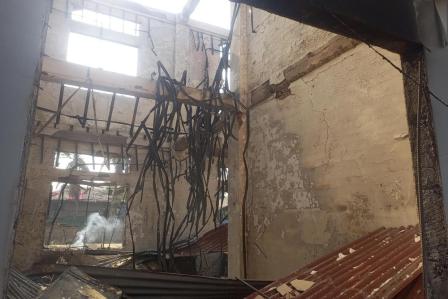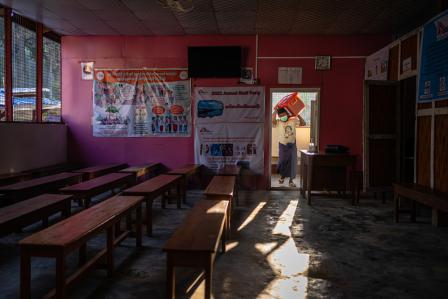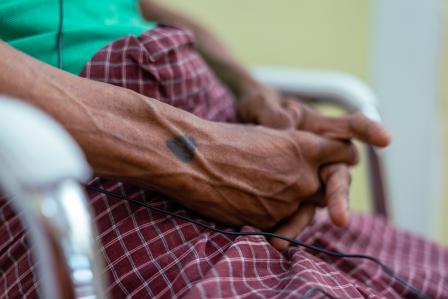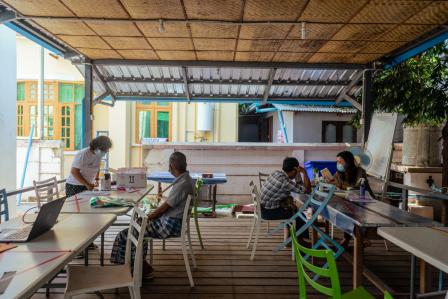Myanmar: Hope and solidarity in the midst of crisis
MSF’s Thaketa clinic as seen from the outside. © Lwyn Phyu Phyu Kyaw/MSF
The sweet fragrance of jasmine flowers strung across the rearview mirror of a taxi I was in offered the only sense of familiarity in a country that had changed dramatically overnight. That morning, February 1, I had woken up stunned, like millions in Myanmar, to the news that the military had declared a state of emergency and seized power from the country’s civilian leadership.
As we drove through the eerily quiet streets of Yangon, the city seemed to lie in a stupor. What the taxi driver asked me that day while dropping me off would become the defining challenge for me and for many others in the coming days, “will the international community help us?”.
As the fierce and violent backlash against protesters over the last days shatters lives, as health care workers and others come under fire, as dreams and aspirations vanish, that question is becoming painfully pressing.
Overcoming the initial shock, hundreds of thousands of people across Myanmar had swiftly mobilized, steeling up for weeks and months of unrelenting struggle. I saw many of my otherwise composed Burmese colleagues overcome by grief but grittily determined to stand with their communities.
My initial worries paled in the face of the enormity of what many people in Myanmar faced. As many mourned the loss of their future in one fell swoop, I feared for the safety of our staff, and worried over disruptions in ongoing care for many of our patients.
As a humanitarian, I have been drilled for years to navigate the treacherous slope of politics through the impartial lens of needs. We mold our action to those needs, negotiating with whomsoever holds the keys to unlock access to the people we want to assist. I assumed our foreignness would dissuade us from riding the tide of emotions. But sometimes these self-fashioned bubbles burst.
In Myanmar today, people clamour for something way beyond what we can provide—liberty and justice, safety and security. I have received imploring messages from my colleagues, some who said they didn’t feel safe, others that they felt unprotected, vulnerable.
Most said, people wanted more than mere material support: a feeling of solidarity, a sense that they weren’t alone, assurances that their fledgling dreams won’t fizzle out. They expected us to choose a side; unequivocally condemn the military takeover.
A neutrality-wielding humanitarian, I agonizingly felt the limits of our action. But I hung my head, offered words of support, and went back to drawing plans for supporting emergency medical needs.
Meanwhile, a civil disobedience movement was gaining force. What I thought was our responsibility amid widespread disruptions in public services—to cover health needs—was perceived by some as sustaining a public system, which in their eyes had lost all legitimacy. For them, continuing to prop up state facilities felt a betrayal of their communities that had vowed non-cooperation.
Despite these concerns, we couldn’t abandon our patients and jeopardize their access to healthcare. So, we adapted our ways of working to be better accepted by the people including our staff.
We are used to providing lifesaving health services in the direst of situations. But this very image of providing clinical care amid turmoil came across to some as indifference at their plight.
This is not to say people have shunned offers of support or don’t need medical care. Communities have swiftly mobilised to care for the wounded and injured during the clashes. A community-led network of health care has rapidly emerged. Their commitment, solidarity and capacity has ensured they have covered urgent medical needs, which humanitarians couldn’t.
Even as I mobilise my organization to support communities to care for the wounded and injured, I can’t help but worry about the far-reaching impact a prolonged instability will have across Myanmar.
State administrations, especially at the provincial level, are coming to terms with the military takeover, and have increasingly become a site of struggle for the military and their civilian counterparts to assert legitimate control.
Public health is already being hit hard. Health services have been disrupted and the consequences for patients undergoing long-term treatment including people living with HIV could be dire, wiping away years of progress Myanmar has made in reducing HIV transmission.
For organizations like mine that have been supporting Myanmar’s health authorities in expanding treatment for HIV, Hepatitis C and TB, among others, the current impasse spells weeks and months of uncertainty. We no longer have a counterpart to collaborate with in addressing health needs which we would have otherwise covered in partnership with health authorities. And we remain concerned about how this will impact our ability to gain access to vulnerable populations.
After years of directly providing HIV treatment to thousands of patients, we had started transferring patients to Myanmar’s National Aids Programme—a vital indicator of Myanmar’s increasing domestic capacity in providing comprehensive health services. The transfer is now on hold. In the meantime, we continue to provide refills and enroll new patients on treatment so long as the National Aids Programme remains inoperative. But if the current stalemate drags on, we are not sure how long we could sustain this work. in the absence of partners, medications and staff at public health facilities
The economic consequences of COVID-19 had already cast shadows over Myanmar’s ability to expand health services. Now as the country’s economy nosedives in the aftermath of the military takeover, poverty rates are likely to soar, exponentially increasing the need for the international assistance to keep populations afloat. But with foreign donors withholding new funding, the impact on life and health outcomes risks being felt for years to come.
Although my answer to the question the taxi driver posed was grossly insufficient, the least we can do is to stay beside our colleagues and patients in these testing times, to aim to preserve the health for the most vulnerable.
This op-ed was published in The Jakarta Post on 23 March 2021.
Francesca Quinto is Médecins Sans Frontières Switzerland’s Head of Mission in Myanmar.



